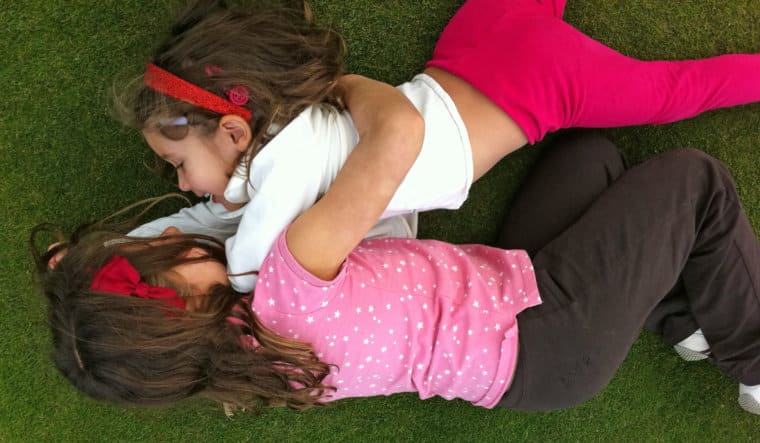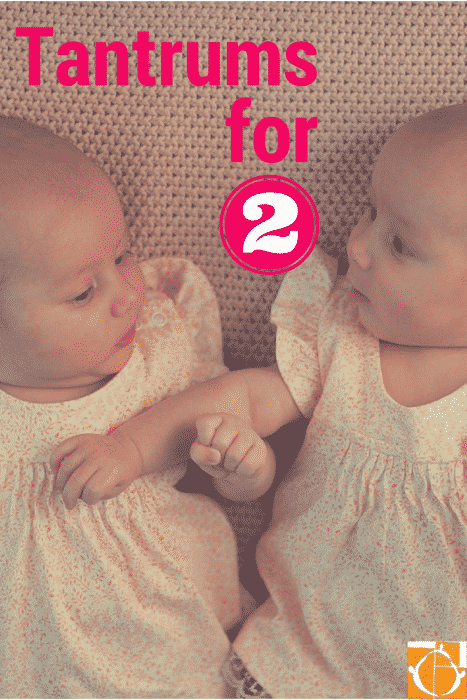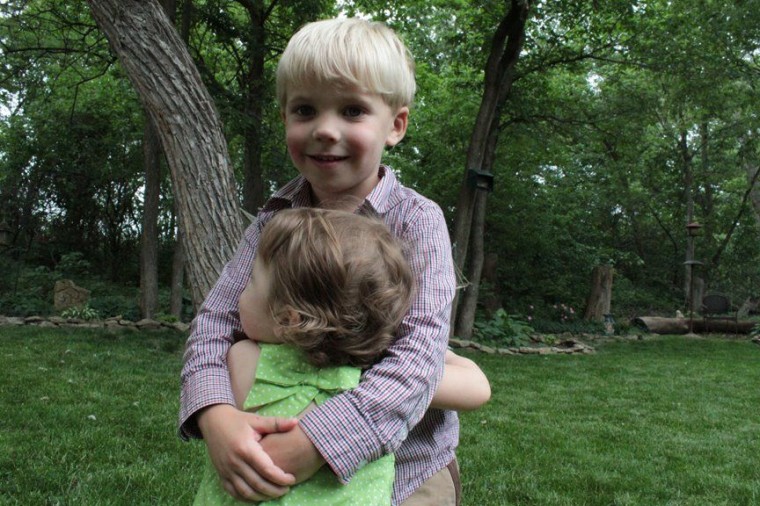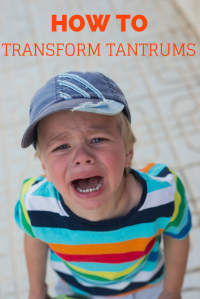Q. Do you have any tips on helping 2-year-old twins who tantrum at the same time and very, very often? Most of the time I'm the only one there to listen and it just doesn't seem like it's enough!
A. It sounds like you’ve got a challenging situation on your hands! I'm glad you’ve asked for our help. It's really hard when twins’ feelings are inflamed at the same time. Their issues may differ, but once one twin is upset, the unresolved feelings the other child carries are triggered, so you’ve got two children using the same unruly but effective healing process for two different bundles of feelings.
 I think that it will be good to think of your children as each having an “emotional project” that they are working on. Maybe it's frustration. Two is an age when a child's expectations of what she can do and how the world should work for her often runs far ahead of what she can actually accomplish. She expects a lot, and doesn't tolerate dashed expectations at all. This is actually a good thing–we don't want our children to be willing to go around feeling discouraged all the time! We them to hope for a lot, try for a lot, and blast off a lot of feelings when it all doesn't work out just as they expected. Their strategy–get the upset out of the way the minute it hurts—is really challenging for a parent (especially a parent alone with twins!), but it’s also normal, healthy and intelligent.
I think that it will be good to think of your children as each having an “emotional project” that they are working on. Maybe it's frustration. Two is an age when a child's expectations of what she can do and how the world should work for her often runs far ahead of what she can actually accomplish. She expects a lot, and doesn't tolerate dashed expectations at all. This is actually a good thing–we don't want our children to be willing to go around feeling discouraged all the time! We them to hope for a lot, try for a lot, and blast off a lot of feelings when it all doesn't work out just as they expected. Their strategy–get the upset out of the way the minute it hurts—is really challenging for a parent (especially a parent alone with twins!), but it’s also normal, healthy and intelligent.
 Small children are smart to tantrum. They’re smart to eject the frustration or bigger feelings spinning around inside them in this way. Often, little frustrations can trigger a child's storehouse of feelings that are left over from difficulties they endured that we might not be aware of. A crowded prenatal environment, a difficult birth, early separation because of medical issues, or other common occurrences with twins that no one considers out of the ordinary can be quite hard on a vulnerable infant. So if a child's tantrum goes on for more than about 15 minutes, you can guess that he or she has moved on from offloading a momentary frustration to working through an issue that caused her some deeper fear. And, as loud and uncomfortable as it is for a sensitive parent, your children’s emotional outbursts are perfectly OK. As long as they have the reassurance of your presence, and presence of mind, they’re healing, even if they have to share your caring attention.
Small children are smart to tantrum. They’re smart to eject the frustration or bigger feelings spinning around inside them in this way. Often, little frustrations can trigger a child's storehouse of feelings that are left over from difficulties they endured that we might not be aware of. A crowded prenatal environment, a difficult birth, early separation because of medical issues, or other common occurrences with twins that no one considers out of the ordinary can be quite hard on a vulnerable infant. So if a child's tantrum goes on for more than about 15 minutes, you can guess that he or she has moved on from offloading a momentary frustration to working through an issue that caused her some deeper fear. And, as loud and uncomfortable as it is for a sensitive parent, your children’s emotional outbursts are perfectly OK. As long as they have the reassurance of your presence, and presence of mind, they’re healing, even if they have to share your caring attention.
To handle the situation there are a couple of strategies that will help you.
First, find a listener for yourself
–Someone who won't interrupt you, won't judge you or your parenting, who won't give advice, and who will marvel at your love, your energy, and your resourcefulness, even when you're describing your hardest moments. You’re working very hard and you deserve some caring attention! We have more on how to set up a Listening Partnership here. The chance to relax, to tell someone the details of how hard you are working and the feelings that come up for you when your twins are beside themselves can be uniquely valuable and helpful.
Second, just sit down, keep each child safe from harm, and listen.
When they begin to wind down, ask them warmly as possible, “Are you still thinking about the toast I cut the wrong way?” or “Yes, your sister has the ball you want. I'll help you wait for it” or “We really do need to brush teeth now. Are you ready yet?” and if they're not finished being upset, they'll go right back to the intense tantrum or cry that scrubs out the emotional distress that has addled their minds. You can spend a minute focusing your attention on one, then turn to the other and offer a minute to him/her. You can try to keep a hand on the one you're not looking at, so that each of them have some tangible sign of your caring. The longer the tantrum goes, the faster your child will move through the emotional project he or she has started. I strongly suggest that you buy a pack of foam earplugs, and keep them in your pocket all day every day, so that you have a bit of a buffer against their loud voices. It’s easier to listen when one’s eardrums aren’t hurting, and one’s instinctive response to screaming isn’t fully triggered.
If you are tired and out of patience yourself, as they begin, you can sit with them, manage general safety, and have a cry yourself. We all have days that can be improved this way! Just try to stay close to them, because they need you to be as present as you can while they're working things through, but sometimes, to be present, a parent needs to release some feelings, too. Your job is such a big one, and you've been doing double duty in the hard work of parenting for a couple of years now! You will want to bring a listener on board on a regular basis so you’ve got adult support, but a few moments of crying in a difficult moment can help to clear a parent’s mind and help move her toward a cheerier day.
 When you're too stretched to pay good attention while they tantrum, try to at least stay close by–being abandoned by an adult while feelings are wide open is a scary thing for a child, and it prolongs the upset greatly. It can help to talk to your children now and then—it helps them feel your caring, and it will help you stay oriented, too. Saying things like, “I know it’s hard. I’m sure we can get back to playing in awhile,” or “I’m right here. I will stay here until you’re ready to brush your teeth,” or “Your sister will feel better, I promise. I’m keeping her safe, and am right here for you, too.” Here are a few more ideas of what to say during Staylistening.
When you're too stretched to pay good attention while they tantrum, try to at least stay close by–being abandoned by an adult while feelings are wide open is a scary thing for a child, and it prolongs the upset greatly. It can help to talk to your children now and then—it helps them feel your caring, and it will help you stay oriented, too. Saying things like, “I know it’s hard. I’m sure we can get back to playing in awhile,” or “I’m right here. I will stay here until you’re ready to brush your teeth,” or “Your sister will feel better, I promise. I’m keeping her safe, and am right here for you, too.” Here are a few more ideas of what to say during Staylistening.
Don’t worry when the same kind of incident kicks up feelings over and over again for one twin or the other. I know that it can seem like they’ll never get over their vulnerability to whatever triggers big feelings. What’s happening is that each child has a certain kind of trigger that sets of a big set of early feelings of helplessness or fear. As she tantrums, she works off one small chunk of that big feeling of hurt. You pour in confidence, she pours out fear and/or frustration. After each emotional episode, your child will have recovered a portion of her confidence, a bit of resilience, and an improved ability to feel connected to you and the others she loves. Children’s early fearful moments take awhile to heal. They peel the layers of hurt away, tantrum by tantrum. So don’t look for signs of progress during the emotional episodes. Look for signs of progress afterward. Is each child more able to maintain relaxed eye contact? Is each child more affectionate, or more open to affection? Is each child able to laugh more easily, or more contented in play? These are the signs that the healing process is at work, not the frequency or intensity of your children’s tantrums.
Your ability to stay close, offer your attention, and listen to their feelings is all your children need from you. They're doing the hard and sometimes lengthy job of clearing out upsets and recovering from emotional bumps and bruises. They just need opportunities to do that, with your caring flowing toward them whenever possible. They’ve got a strong instinct to heal, and this highly emotional stage will pass. I encourage you to get good support for yourself while things are intense with your twins. As your children’s loving and hardworking mom, support for you is vital!
 For your free copy of Tantrums and Indignation by Patty Wipfler, click here.
For your free copy of Tantrums and Indignation by Patty Wipfler, click here.

